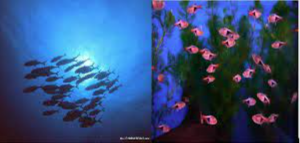SCHOOLING OR SHOALING?

My initial motivation for applying to an open networked learning (ONL) course and becoming a more active participant in online learning, was to experience it as a learner but also to be able to transfer what I have learned to my students and my work in general in the future.
The learning is organized around topics related to our presence in the digital world, with plenty of input in the form of webinars, further readings, blogs, etc., and through a collaborative process within a problem-based learning (PBL) (Savin Baden 2020) group we are assigned to. The activities in the PBL group are guided by the FISH (Nerantzi & Uhlin, 2012) document (hence the title of my blog :-)) which should help us lead fruitful discussions.
Let me elaborate here on the fish metaphor to describe what it feels like to experience the first two weeks of the PBL and ONL course. I would say that most of us started as a shoal of fish which is a group of scattered fish, everyone for themselves kind of feeling, yet hanging around together, and then slowly but steadily becoming a school of fish, which is a more organized group of these lovely creatures heading in the same direction. I suppose as our topics change, we will be switching from one type to another as we go along our ONL learning path.
The PBL Group 5 I am in, which we collectively named Take V, is a great place to be since we all come from diverse backgrounds professionally as well as culturally, which is a challenging but also a very inspiring experience for me, helping me grow both professionally and personally. In my opinion, it is important to implement both collaborative and critical thinking skills to be able to successfully participate and contribute to your group’s work. This is true both for the digital and analog worlds. We need to see beyond our perspective, be open to others, and be ready to share and interact. It is not always easy to do that, in particular when we have different views on the topic, but that is what makes this experience so significant and powerful. On this journey, I feel that we will learn a lot about ourselves as well as others.
Regarding our topic and the scenario, after very insightful discussions on digital literacy, online participation, and the problem in the scenario we opted to concentrate more on critical thinking skills as a tool that is helpful in our daily lives, enabling us to thrive in the context of our education both as learners and educators.
What I have learned exploring the resources (David White ; Doug Belshaw; ONL), our group discussions and through my experience as a teacher, digital literacy is a range of skills and competencies required to thrive in the digital world both privately, academically, and professionally. It is vital to understand that the digital environment and digital tools can contribute to the concept of global citizenship and democratization of society and increase the outreach of education to the most geographically / culturally remote communities. For an individual, it is important to learn and acquire abilities to plan their online actions, select content critically, use adequate tools, engage creatively and critically with others, evaluate and reflect on digital activities that lead to solving life’s tasks, and boost one’s digital literacy competence.
To sum up, on our ONL journey we might sometimes be swimming, paddling, sailing, or even speed boating, yet we are all in this together, challenging and supporting each other.
Reference
Belshaw, D. https://dougbelshaw.com/blog/
Nerantzi, C. & Uhlin, L (2012) FDOL131 Design, available at http://fdol.wordpress.com/fdol131/design/
ONL https://www.opennetworkedlearning.se/about-onl/onl-design/
Savin Baden, M. (2020). What Are Problem-Based Pedagogies? Journal of Problem-Based Learning 7(1): 3-10.
White, D. https://daveowhite.com/vandr/
This is a great post that captures your experience in the ONL course vividly! The metaphor of transforming from a shoal to a school of fish is particularly effective. It illustrates the journey of individuals becoming a united group with a shared purpose. In addition, I completely agree with your point about the importance of both collaboration and critical thinking in the digital world (and beyond!). Being able to see beyond our own viewpoint and engage with others constructively is essential for success.